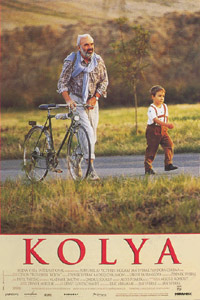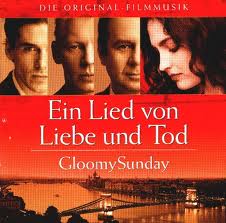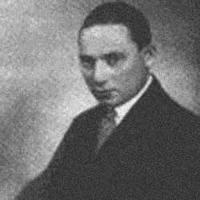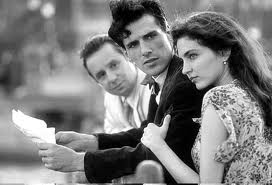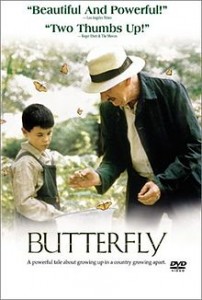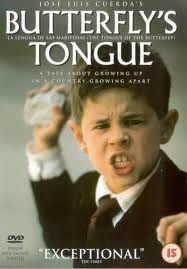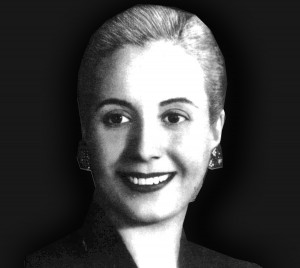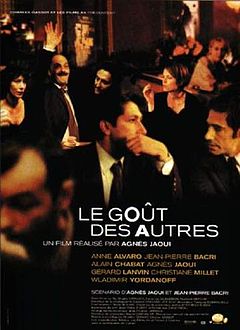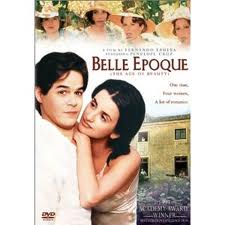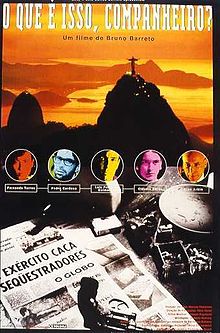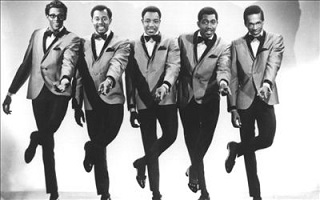 This TV miniseries about the musical group The Temptations premiered on NBC in 1998; it was made based on the autobiography of Otis Williams, who is the lone surviving member of the original Temptations and considered to be the leader of the group (though was never the lead vocal). The Temptations, a black vocals group from Detroit, Michigan, successfully rocketed to the top of the Billboards with Motown Records during the 1960s and 70s. They are known for their sweet harmonies, soulful vocals, and smooth dance steps, and the group earned the Grammy Lifetime Achievement Award. This miniseries The Temptations tells the story (from the viewpoint of Otis Williams) of the group from the early days until the deaths of all of the other core members; it was produced by Otis Williams and The Temptations’ manager of many years, Shelley Berger.
This TV miniseries about the musical group The Temptations premiered on NBC in 1998; it was made based on the autobiography of Otis Williams, who is the lone surviving member of the original Temptations and considered to be the leader of the group (though was never the lead vocal). The Temptations, a black vocals group from Detroit, Michigan, successfully rocketed to the top of the Billboards with Motown Records during the 1960s and 70s. They are known for their sweet harmonies, soulful vocals, and smooth dance steps, and the group earned the Grammy Lifetime Achievement Award. This miniseries The Temptations tells the story (from the viewpoint of Otis Williams) of the group from the early days until the deaths of all of the other core members; it was produced by Otis Williams and The Temptations’ manager of many years, Shelley Berger.
 For as long as I can remember, I have loved The Temptations for their feel-good and heartfelt tunes, as well as their great group performances. I had always assumed, though, that the five sharply-dressed members that danced and sang wonderfully together in videos I had seen got along with each other as well as they harmonized, and that those five people always equaled The Temptations. However, as shown by this TV miniseries that provides an overview of The Temptations over nearly 50 years, the group members changed a lot over the years and there were tensions along their journey to the Hall of Fame.
For as long as I can remember, I have loved The Temptations for their feel-good and heartfelt tunes, as well as their great group performances. I had always assumed, though, that the five sharply-dressed members that danced and sang wonderfully together in videos I had seen got along with each other as well as they harmonized, and that those five people always equaled The Temptations. However, as shown by this TV miniseries that provides an overview of The Temptations over nearly 50 years, the group members changed a lot over the years and there were tensions along their journey to the Hall of Fame.
Back in the 1950s, The Temptations were formed from two local groups that were struggling to get their names out—“Otis Williams and the Distants” and one of their rivals, “The Primes.” The combination of the two groups was important; The Primes added the dancing component (Paul Williams was the choreographer for many of their performances) as well as Edie Kendricks’s strong tenor voice featured in many of their early tracks, while The Distants had the bassline and Otis Williams was the organizer needed to establish them as a group. The five original voices of The Temptations harmonized beautifully, but they still didn’t see success on the Billboards, and even became known as “The Hitless Temptations.” Frustrated, one of the members, Al Bryant, quit in the 60s and was replaced by David Ruffin, an aspiring singer and a fan of The Temptations. Now with Ruffin, The Temptations released their first Top 20 hit (“The Way You Do the Things You Do”), and later their number-one hit “My Girl” featuring Ruffin’s vocals. These five members are considered the “Classic Five” (the five I had associated with The Temptations). Throughout the 1960s, The Temptations released hit after hit and became internationally known, mainly with David Ruffin as the lead singer.
 However, David Ruffin expected more money, wanted the group name to be changed to “David Ruffin & The Temptations” (much like “Diana Ross & The Supremes” or “Smokey Robinson & The Miracles”), increasingly used cocaine, and began missing practices and even some performances. Ruffin was fired in 1968 and replaced with Dennis Edwards. However, on multiple occasions, Ruffin snuck into their performances and hijacked the microphone from Edwards, pleasantly surprising avid fans of the Classic Five who were critical of the new Edwards. It is said that, due to the still strong popularity of David Ruffin, Otis Williams wanted to fire Edwards and bring Ruffin back in, but due to Ruffin’s continued unreliability, Edwards was kept on. Finally, with their Top 10 hit single “Cloud Nine”—which won a Grammy—featuring lead vocals by Dennis Edwards, Edwards was beginning to be accepted as part of The Temptations. In 1989, The Temptations—the Classic Five plus Dennis Edwards—were inducted into the Rock and Roll Hall of Fame.
However, David Ruffin expected more money, wanted the group name to be changed to “David Ruffin & The Temptations” (much like “Diana Ross & The Supremes” or “Smokey Robinson & The Miracles”), increasingly used cocaine, and began missing practices and even some performances. Ruffin was fired in 1968 and replaced with Dennis Edwards. However, on multiple occasions, Ruffin snuck into their performances and hijacked the microphone from Edwards, pleasantly surprising avid fans of the Classic Five who were critical of the new Edwards. It is said that, due to the still strong popularity of David Ruffin, Otis Williams wanted to fire Edwards and bring Ruffin back in, but due to Ruffin’s continued unreliability, Edwards was kept on. Finally, with their Top 10 hit single “Cloud Nine”—which won a Grammy—featuring lead vocals by Dennis Edwards, Edwards was beginning to be accepted as part of The Temptations. In 1989, The Temptations—the Classic Five plus Dennis Edwards—were inducted into the Rock and Roll Hall of Fame.
In the 1970s, two more of the Classic Five—Paul Williams and Eddie Kendricks—were also replaced. Paul Williams’s health was declining so was forced to resign, while Eddie Kendricks—unhappy with the direction of The Temptations, his best friend Paul being out of the group, and the control of Otis Williams—decided to go solo. Dennis Edwards, who had replaced David Ruffin, also had ongoing tensions with Otis Williams, and was also replaced in 1976. (This miniseries shows very little about Edwards and his on-and-off participation in The Temptations). Regarding many of their hits from the 1970s, leader Otis Williams commented, “While you hear our voices weaving together so smoothly, we were actually fragmenting.” In the 1980s, The Temptations did a “reunion album,” that featured the more “classic” sound of The Temptations and brought back Ruffin, Kendricks, and Edwards. These three later did their own tour titled “Former Leads of The Temptations.”
When looking at the incredibly talented and influential Temptations over the years, there are a few interesting things I wish to highlight.
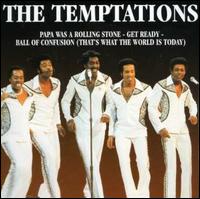 First, the adaptation of the group to changing times. The Temptations—initially with a doo-wop, classical Motown sound that mainly sang about love—started incorporating more funk in the late 1960s and early 70s, such as the electronic wah-wah sound featured in “Cloud Nine” and “psychedelic” rhythms. Also, the lyrics began to incorporate the social and political changes that were erupting in the turbulent times of the 1970s, in contrast to their earlier characteristic love ballads. For example, their song “Ball of Confusion (That’s What the World is Today),” was about the unknown future and brings up issues such as violence and segregation. This change is also seen with other Motown hits such as Marvin Gaye’s “What’s Going On?”which addresses the Vietnam War over a funky beat.
First, the adaptation of the group to changing times. The Temptations—initially with a doo-wop, classical Motown sound that mainly sang about love—started incorporating more funk in the late 1960s and early 70s, such as the electronic wah-wah sound featured in “Cloud Nine” and “psychedelic” rhythms. Also, the lyrics began to incorporate the social and political changes that were erupting in the turbulent times of the 1970s, in contrast to their earlier characteristic love ballads. For example, their song “Ball of Confusion (That’s What the World is Today),” was about the unknown future and brings up issues such as violence and segregation. This change is also seen with other Motown hits such as Marvin Gaye’s “What’s Going On?”which addresses the Vietnam War over a funky beat.  Since then to the present, the contemporary Temptations have incorporated a Eurodance beat characteristic of the 80s, the slow and simple R&B beats of the 90s, and even auto-tunes—which dominates pop music today—in their most recent album. Regarding this adaptation, leader Otis Williams says that the group has to “live in the present while respecting the past.” Also, as an undercurrent in this miniseries, we see the tough transition from segregated America—where The Temptations are considered for “black audiences only”—to integrated America—where black and white people stand together in the crowds.
Since then to the present, the contemporary Temptations have incorporated a Eurodance beat characteristic of the 80s, the slow and simple R&B beats of the 90s, and even auto-tunes—which dominates pop music today—in their most recent album. Regarding this adaptation, leader Otis Williams says that the group has to “live in the present while respecting the past.” Also, as an undercurrent in this miniseries, we see the tough transition from segregated America—where The Temptations are considered for “black audiences only”—to integrated America—where black and white people stand together in the crowds.
Second, the tragically young deaths of many of the members. Of the Classic Five, Paul Williams suffered from health issues and alcoholism, and committed suicide at the age of 34; David Ruffin died at the age of 50 from a cocaine overdose; Eddie Kendricks died at the age of 52 due to lung cancer; and Melvin Franklin—the bassist who stayed in The Temptations until right before his death—suffered from many health problems, and died at the age of 52 after a series of seizures. Al Bryant of the original five died at the age of 36 from a liver disease. Otis Williams (74 years old now) is the only surviving member of the original or Classic Five. Also, Roger Penzabene, the songwriter who wrote their hits “I Wish It Would Rain” and “I Could Never Love Another (After Loving You)” based on his own heartbreak, committed suicide. Life as an artist can be mentally and physically exhausting, and so many incredibly talented people die young. (27 Club)
Lastly, what really makes “The Temptations”? There is a musical group called The Temptations that is still active today, and it is still led by Otis Williams—who never had lead or distinctive vocals in any of The Temptations’ many hits. The tagline of The Temptations today is “55 Years & Still Going Strong,” and Otis Williams says that “reinvention is the name of the game.” The lineup has changed several more times over the years, and even some of these newer members have gone off and created their own Temptations splinter groups. Dennis Edwards—the original replacement for David Ruffin of the Classic Five, and the only other surviving of the six members that were inaugurated into the Rock and Roll Hall of Fame—has his own group, The Temptations Revue. Over the years, there have been 24 people who were at least for some time considered a Temptation. As Eddie Kendricks aptly says in the dramatized miniseries when he quits The Temptations, “There’s getting to be more ex-Temptations than Temptations.” Interestingly, with the members being replaced one after another, none of the current members of The Temptations have worked with any of the original Temptations other than Otis Williams. Because of this and the gradual change in sound over the years, the original name of “Otis Williams and The Distants” seems more appropriate now. It seems that Otis Williams is clinging onto the name because of all of the respect there is for The Temptations.
Since this miniseries is based on Otis Williams’s autobiography, it is certainly biased, especially regarding the positive leadership of Otis Williams and the tensions between group members. Several people, including Otis Williams’s ex-wife and David Ruffin’s family, filed lawsuits against the miniseries for the negative and biased representation of characters, but the court ruled in favor of the defendants. Otis Williams also claimed that, although it was based on his autobiography and he is considered to be a producer, he did not have much say on how things were presented.
 This miniseries, though biased, gives a good overview of the fascinating, yet turbulent history of the incredible musical group The Temptations. Watching this miniseries in combination with Standing in the Shadows of Motown—a documentary that sheds light on the Funk Brothers, the incredibly talented, but overlooked back band of many of The Temptations’ hits as well as many other Motown classics—and Get Ready: Definitive Performances—which is a collection of recordings of live performances by The Temptations during the 1960s and 70s that shows the charm of their actual dancing and stylish suits—is truly inspiring as well as informative regarding the amazing impact these musicians had on modern music.
This miniseries, though biased, gives a good overview of the fascinating, yet turbulent history of the incredible musical group The Temptations. Watching this miniseries in combination with Standing in the Shadows of Motown—a documentary that sheds light on the Funk Brothers, the incredibly talented, but overlooked back band of many of The Temptations’ hits as well as many other Motown classics—and Get Ready: Definitive Performances—which is a collection of recordings of live performances by The Temptations during the 1960s and 70s that shows the charm of their actual dancing and stylish suits—is truly inspiring as well as informative regarding the amazing impact these musicians had on modern music.
Sakuranbo

